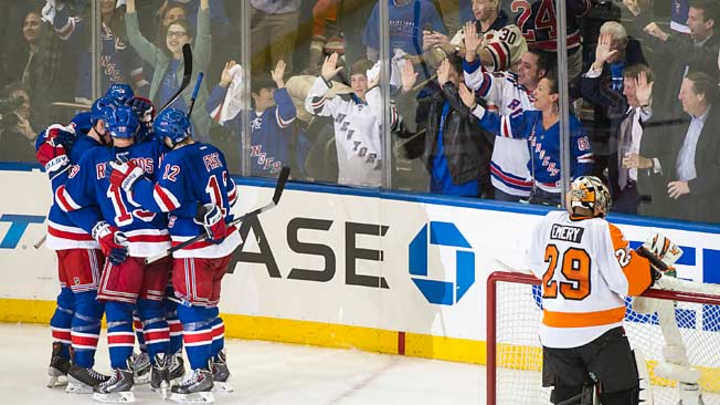Rangers take advantage of the power play to win Game 1 over Flyers

A four-minute power play in the third period helped the Rangers score twice in 47 seconds. (Cal Sport Media via AP Images)

By Sarah Kwak
NEW YORK — This was supposed to be a special day for Flyers winger Jason Akeson -- he was playing in his first NHL playoff game, and making just his third appearance in the league overall. It’s one he’ll remember for the rest of his life, though chances are, he’ll want to forget it as soon as Friday. Skating on a line with Sean Couturier and Matt Read, the youngster was earning his ice time. He was aggressive, and finishing his checks — but one, he finished poorly.
Game 1 of the first-round series between Philadelphia and the Rangers was knotted 1-1 midway through the third period at Madison Square Garden on Thursday night when the 23-year-old Akeson went in to hit New York winger Carl Hagelin on the boards in the neutral zone. Akeson took Hagelin off the puck, but his stick caught Hagelin up high. When a rookie dreams of changing the course of a game with his stick, this isn’t what he imagines. Akeson’s blade drew blood, and a double minor.
“[Akeson’s] got to be better with his stick,” Flyers coach Craig Berube said after the game. “[He] played a pretty good game, but you’ve got to control your stick.”
The penalty was costly. The Rangers' power play went to work and scored twice in 47 seconds to break the 1-1 tie. New York went on to win 4-1.
A few more observations from Thursday night’s game, and questions for Game 2 on Sunday:
Game recap | Box score | Highlights
• We should marvel at how far Brad Richards has come in the last year. Just 11 months ago, the Rangers veteran saw his minutes drop precipitously in Game 7 of New York's first-round series against the Capitals. Against the Bruins in the next round, he was a healthy scratch for two games. The 33-year-old looked like a prime candidate for an offseason compliance buyout, but the Rangers didn’t unload his unwieldy nine-year contract and $6.67 million cap hit. On Thursday night, Richards proved his value. “He had a real good game -- at both ends,” Rangers coach Alain Vigneault said. “When his line was on the ice, they were real dependable ... And on the power play, obviously, he made two really great plays that permitted us to score both those goals.” From his first shift, Richards looked like he had brought some extra oomph to his game for the postseason. He was the key to both power play goals, scoring the first on a one-timer from the right circle, and then making a heads-up shot-pass on the second to set up Derek Stepan, who was waiting on the doorstep of Flyers goalie Ray Emery. Richards picked up another assist on the Rangers’ fourth goal, taking a shot that rebounded in tight, which Hagelin rammed hom at 15:52 of the third period. It’s one game, and Richards' age still shows in his lack of speed, but on Thursday night, the former Conn Smythe winner played like one.
• Philadelphia lost the face-off battle in more ways than one. The Flyers took 47 percent of the draws to the Rangers’ 53 percent. But the more troubling stat for Philly was where those draws were being taken. Of the 18 face-offs in the first period, 12 were in the Flyers’ defensive zone. For the game, 59.2 percent of the draws were in Philly’s end. Of course, looking at the shots -- New York outshot Philadelphia 36-15 -- it’s obvious who controlled possession. But looking at where the draws were taken is another way to show how much time the Flyers spent in their own end. More to the point, it shows their defensemen’s failure to swiftly and efficiently clear the zone.
• Many expected that this intradivisional series would come with some built-in historical animosity, but that didn’t really play out between whistles. “[Discipline] was one of our strengths all season, that’s not going to change now,” Vigneault said. Of course, with as much history as these two teams share, there hasn’t been much recent hatred built into this rivalry. All it takes is one play to change all that, but at least for Game 1, the chippiness level was low.
• Rangers defenseman Ryan McDonagh played his first game since April 1, and after his first period Vigneault joked, “I feel I should’ve played him [in our last regular season] game against Montreal.” McDonagh admitted after the game that a combination of nerves and being away from game's pace and speed set him back in the beginning. But in the second period, he said he began to feel more like himself. “He found his hands and he found his rhythm,” Vigneault said. “He got better and more confident. He’s only going to get better from here.” That would be good news for the Rangers, who will need McDonagh's shut-down game to keep Philadelphia’s scorers at bay.
• Speaking of the Flyers top line, this wasn’t their best game. Scorers Claude Giroux, and Jakub Voracek were both held without a shot on Thursday night, the first time that has happened in the same game this season. Giroux has gone shotless four other times this season -- and two of them were against New York.
Steve Mason
